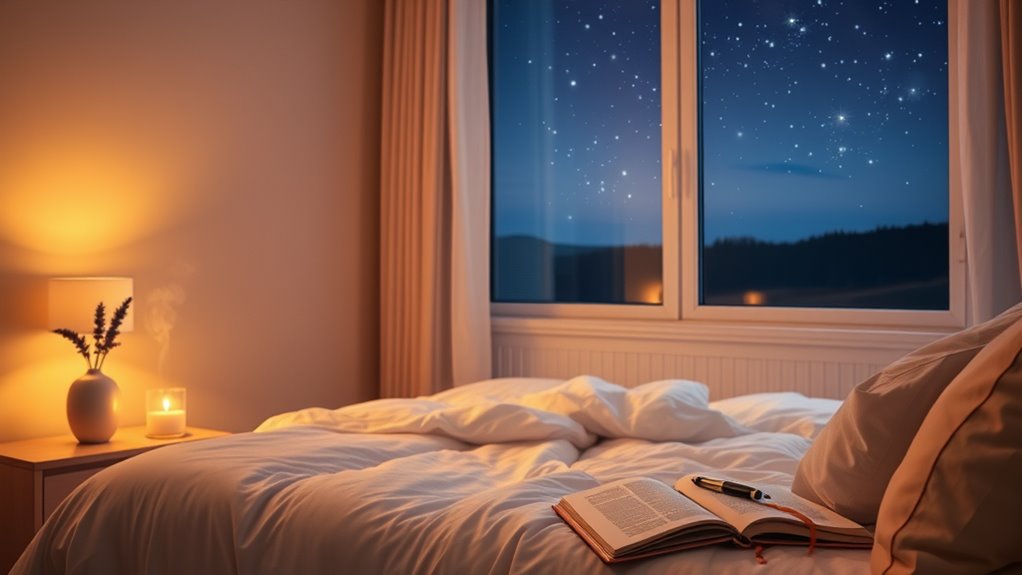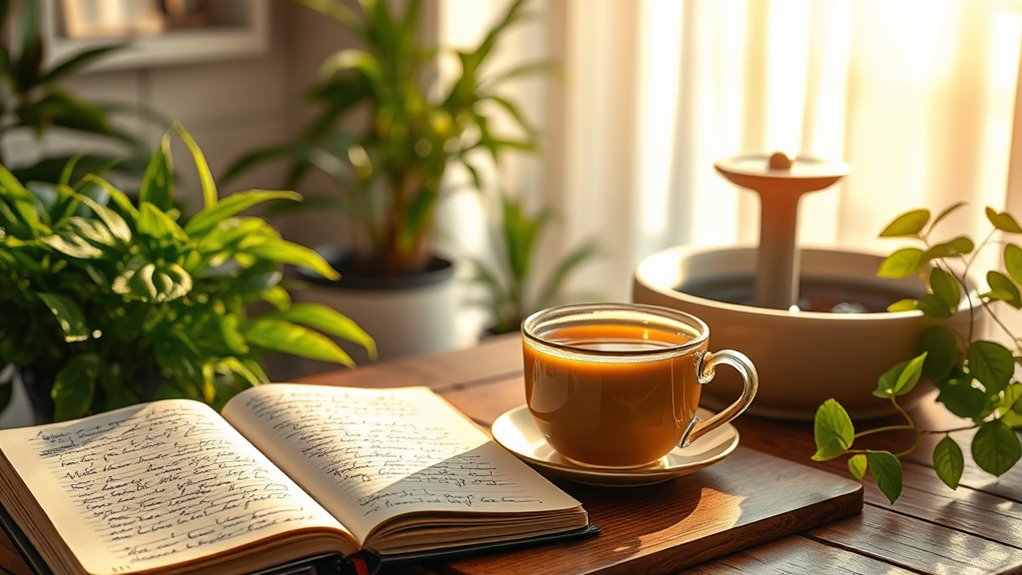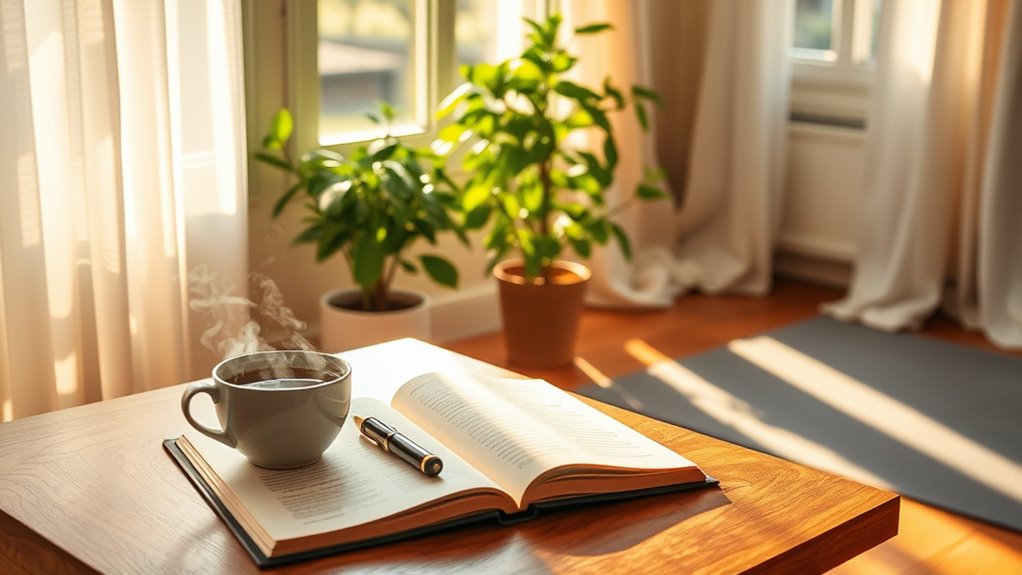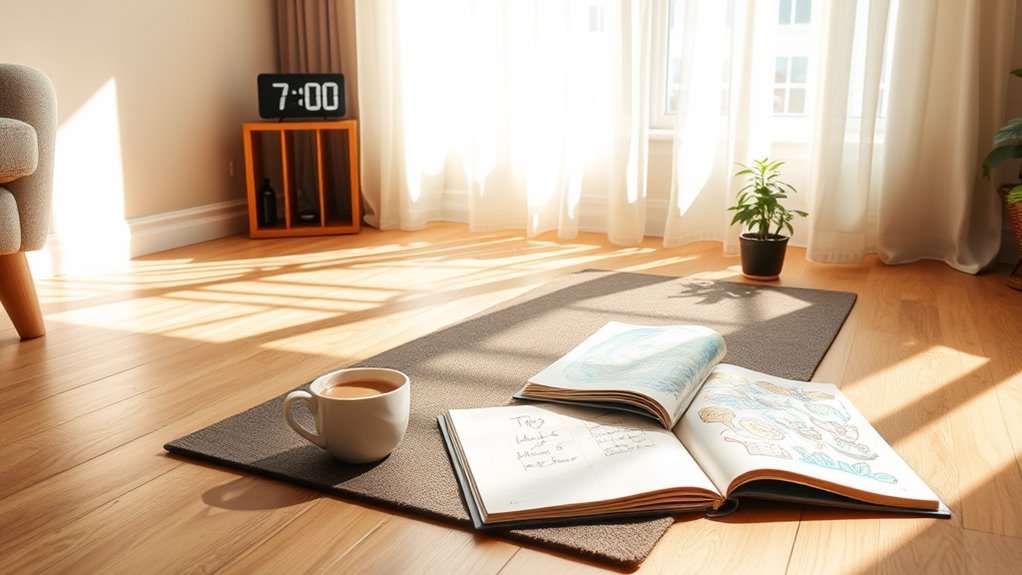How I Improved My Sleep With Just 5 Minutes Before Bed
You can transform your sleep in just 5 minutes each night by establishing a calming routine. Incorporate deep breathing or progressive muscle relaxation to help unwind and signal your body to rest. Create a comfortable sleep environment by keeping your room dark and cool. Consistency is key; stick to the same sleep schedule for better results. And if you’re curious about more strategies to enhance your sleep quality, there’s plenty more to explore.
Key Takeaways
- I established a consistent 5-minute bedtime routine to signal my body it’s time to unwind and prepare for sleep.
- Practiced deep breathing using the 4-7-8 method, which calmed my nervous system and eased my mind.
- Engaged in progressive muscle relaxation, systematically tensing and relaxing muscle groups to release physical tension.
- Created a comfortable sleep environment by ensuring darkness, cool temperature, and minimal noise for better rest.
- Incorporated mindfulness meditation, focusing on my breath to foster relaxation and improve overall sleep quality.
The Power of a 5-Minute Routine
When you take just five minutes to establish a bedtime routine, you can greatly enhance your sleep quality. This short yet powerful practice sets the stage for better sleep by signaling your body to unwind. Embrace Serenity with a simple evening routine can be a great addition to your preparations.
Consistency is essential; performing this routine nightly reinforces your body’s natural sleep-wake cycle. Incorporating mobility exercises like knee circles or gentle stretches helps relieve muscle tension, reducing interruptions during the night. Limiting daytime naps is also important, as it can help you maintain a consistent sleep schedule and avoid interfering with your nighttime rest.
Even brief activity regulates body temperature and energy levels, directly impacting your overall sleep hygiene. By making this small commitment, you not only prepare for rest but also improve your physical well-being, fostering better mental health. A calming end to your day can help you feel more at peace before sleep.
Ultimately, this five-minute ritual can transform your sleep experience, leading to deeper, more restorative slumber.
Relaxation Techniques That Work
To improve your sleep quality, incorporating effective relaxation techniques into your bedtime routine can make a significant difference. Here are some powerful methods to try:
| Technique | Description | Benefits |
|---|---|---|
| Deep Breathing | Use the 4-7-8 method to calm your nervous system. | Reduces stress and anxiety. |
| Progressive Muscle Relaxation | Tense and relax muscle groups for tension release. | Enhances physical relaxation. |
| Guided Imagery | Visualize peaceful scenes to quiet your mind. | Reduces mental chatter. |
| Mindfulness Meditation | Focus on your breath, acknowledging thoughts. | Improves emotional balance. |
| Non-Sleep Deep Rest (NSDR) | Engage in conscious relaxation without sleeping. | Promotes energy restoration. |
Incorporating these techniques not only helps with relaxation but also supports quality sleep, which is essential for overall health. Additionally, practicing deep breathing techniques can significantly enhance your stress relief efforts. Experiment with these techniques to find what resonates with you, and enjoy a more restful night.
Creating a Comfortable Sleep Environment
Creating a comfortable sleep environment is essential for achieving restful nights, as it directly impacts your ability to fall asleep and stay asleep.
Start by ensuring your room is dark, using blackout curtains to block light pollution that disrupts melatonin production. Aim for a cool temperature between 60 to 67 degrees Fahrenheit, adjusting humidity for ideal comfort. Research shows that establishing a soothing bedtime routine can significantly enhance your sleep quality.
Choose soothing colors like soft blues or greens to promote relaxation, and avoid vibrant hues that stimulate the mind. Minimize noise with earplugs or white noise machines, positioning your bed away from external disturbances. Additionally, access to natural environments has been linked to improved sleep health, so consider incorporating elements like plants or calming water features in your space.
Finally, invest in a supportive mattress and pillows while keeping your space tidy. A clean, organized room fosters tranquility, enhancing your overall sleep quality.
The Role of Consistency in Sleep
A comfortable sleep environment sets the stage for better sleep, but maintaining a consistent sleep schedule plays a pivotal role in ensuring you get the rest you need. By sticking to regular sleep and wake times—even on weekends—you support your body’s natural circadian rhythm. This consistency boosts sleep quality, enhances alertness, and even contributes to better cardiovascular health. Furthermore, it helps manage stress and improves mental well-being, reducing anxiety and aiding emotional regulation. Notably, consistent bedtimes are shown to be more influential than sleep quality or duration in promoting healthier emotional and behavioral outcomes. To maximize benefits, create a routine that includes exposure to morning light and limits evening blue light. Additionally, establishing a comfortable sleep environment can significantly enhance your ability to fall asleep faster and stay asleep longer.
Mindfulness for Better Sleep Quality
While many struggle to find restful sleep, incorporating mindfulness practices into your bedtime routine can greatly enhance sleep quality. Techniques like focused breathing and body scan meditation help calm your mind and body, creating a conducive environment for sleep. Here’s a quick overview of mindfulness strategies:
| Technique | Benefits | Application |
|---|---|---|
| Mindfulness-Based Stress Reduction (MBSR) | Reduces stress and promotes relaxation | Engage in structured sessions |
| Guided Meditation | Induces a meditative state | Listen to calming audio cues |
| Progressive Muscle Relaxation | Releases physical tension | Tense and relax muscle groups |
Additionally, you can transform your sleep with a soothing breathing exercise that promotes relaxation before bedtime.
Frequently Asked Questions
Can I Do My 5-Minute Routine Anywhere?
Yes, you can absolutely do your 5-minute routine anywhere. Just find a quiet, comfortable spot, minimize distractions, and focus on your breathing. Consistency and adaptability will enhance your relaxation and improve your sleep quality.
How Soon Before Bed Should I Start My Routine?
You should start your bedtime routine one to two hours before sleep, allowing your body to wind down, creating a calming environment, and establishing consistency that promotes better sleep quality and overall well-being.
What if I Can’t Relax in 5 Minutes?
If you can’t relax in five minutes, try deeper diaphragmatic breathing or progressive muscle relaxation. Focus on creating a calming environment, limit screens, and establish a consistent bedtime routine to enhance your relaxation efforts.
Are There Specific Yoga Poses for Better Sleep?
Absolutely, specific yoga poses like Child’s Pose and Legs Up the Wall can greatly enhance your sleep. These calming movements gently release tension, allowing your mind and body to embrace tranquility, paving the way for restful slumber.
How Does Sleep Quality Affect My Daily Performance?
Sleep quality directly impacts your daily performance. When you’re well-rested, you enhance concentration, boost decision-making, and improve emotional stability. Poor sleep, however, can lead to decreased productivity and increased stress, hindering your overall effectiveness.
References
- https://www.youtube.com/watch?v=4F68o5NNkjE
- https://time.com/5097840/how-to-fall-asleep-faster/
- https://www.youtube.com/watch?v=SqFniT-Oyt8
- https://www.helpguide.org/wellness/sleep/getting-better-sleep
- https://www.youtube.com/watch?v=WyNFkQLvgE8
- https://www.sleepfoundation.org/sleep-hygiene/healthy-sleep-tips
- https://www.mayoclinic.org/healthy-lifestyle/adult-health/in-depth/sleep/art-20048379
- https://www.mysanitas.com/en/blog/better-sleep-these-5-minute-relaxation-techniques
- https://kokoon.io/en-us/blogs/bufferzone/relaxation-techniques-for-sleep
- https://www.livescience.com/61422-journal-writing-sleep-better.html





